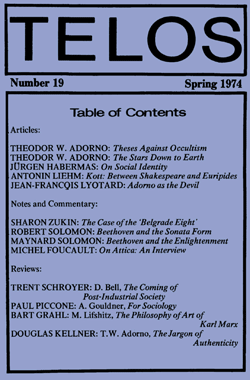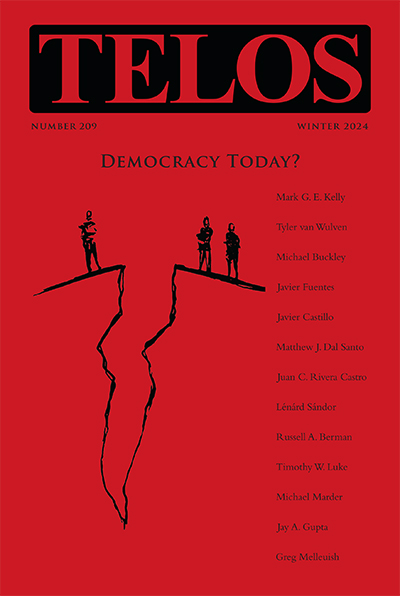As an occasional feature on TELOSscope, we highlight a past Telos article whose critical insights continue to illuminate our thinking and challenge our assumptions. Today, Sunil Kumar looks at Theodor W. Adorno’s “The Stars Down to Earth: The Los Angeles Times Astrology Column,” from Telos 19 (Spring 1974).
 “The Stars Down to Earth” is the content analysis of an astrology column that Adorno wrote during a return visit to the United States from Germany in 1952–53 and appeared in translation in Telos in 1974. The column under scrutiny called, “Astrological Forecasts,” was written by Carroll Righter and appeared in the Los Angeles Times, described by Adorno as a conservative newspaper, leaning far to the right wing of the Republican Party. He engages in a detailed analysis of the column between November 1952 and February 1953. His method is that of the systematic construction of the imagined readers of the column and a critique of the ideology that the column reinforces, that of accepting the social system as fate. Adorno hypothesizes that columns such as these mold to some extent the reader’s thinking and foster an element of blind acceptance. The impetus of the piece, as in “The Thesis against Occultism” (1947), is to highlight the tendency toward irrationality and authoritarianism in mid-twentieth-century Western culture. In the analysis of the column, this irrationality is reflected by the readers’ acceptance of the column’s absurd claim to be inspired by the stars, and the need to look for guidance and succor in the advice of an expert authority on mundane matters. The stars stand in for the reader of the column as a source of authority, and the belief in astrology represents for him or her a belief in a higher order—one that also appears to present to events a veneer of rationality to its opaque origin.
“The Stars Down to Earth” is the content analysis of an astrology column that Adorno wrote during a return visit to the United States from Germany in 1952–53 and appeared in translation in Telos in 1974. The column under scrutiny called, “Astrological Forecasts,” was written by Carroll Righter and appeared in the Los Angeles Times, described by Adorno as a conservative newspaper, leaning far to the right wing of the Republican Party. He engages in a detailed analysis of the column between November 1952 and February 1953. His method is that of the systematic construction of the imagined readers of the column and a critique of the ideology that the column reinforces, that of accepting the social system as fate. Adorno hypothesizes that columns such as these mold to some extent the reader’s thinking and foster an element of blind acceptance. The impetus of the piece, as in “The Thesis against Occultism” (1947), is to highlight the tendency toward irrationality and authoritarianism in mid-twentieth-century Western culture. In the analysis of the column, this irrationality is reflected by the readers’ acceptance of the column’s absurd claim to be inspired by the stars, and the need to look for guidance and succor in the advice of an expert authority on mundane matters. The stars stand in for the reader of the column as a source of authority, and the belief in astrology represents for him or her a belief in a higher order—one that also appears to present to events a veneer of rationality to its opaque origin.
The aim of the essay, as he states, is not a study of occultism; “the occult,” he states, “only plays a marginalized role in systems such as organized astrology.” Astrology, on the other hand, would be better described according to him as “secondary superstition,” or as institutionalized occultism. He sees it as working in tandem with other phenomena of the culture industry, such as films (“dream factories”), and its purpose by and large is to propagate psychological dependence, or rather to help reproduce social dependency as psychological dependency. It is, to put it plainly, the ideology of dependence, one that seeks to “somehow justify painful conditions which seem more tolerable if an affirmative attitude is taken towards them.” Through an analysis of the column, Adorno constructs for us the idealized readers in order to arrive at an understanding of what section of society it is that would be most susceptible to astrology, and what possible need it could fulfill in their lives.
The column’s approach, as he points out, is to foster an atmosphere of social contentment and adjustment and to steer the mind of the reader away from the irrationality surrounding his or her working day so that s/he can internalize this irrationality as being pre-ordained and see it as part of a larger scientific system.
Dependence or submission to abstract power is the lesson to be learned from astrology. As a source of authority, it is just as irrational or opaque as the setup of contemporary society. Through an analysis of the illusory solutions that the column offers to very real problems, Adorno emphasizes the culture of dependence propagated by the column through references to unexpected financial help or advice from friends, family, and “higher-ups” in the workplace. More importantly, as he points out, pseudo-activity such as chores and institutionalized pleasures like shopping are advised so that the individual subjecting herself to the irrational authority of the column would achieve a sense of having participated in her fate, rather than to have blindly submitted to external authority. He thus provides an in-depth and valuable analysis of how the writer(s) of the column feed into a very real need of the readers to rationalize the irrationality of their lives and more importantly to transfer the responsibility for it.
For, while people recognize their dependence and often enough venture the opinion that they are pawns, it is extremely difficult for them to face this dependence unmitigated. Society is made up of those whom it comprises. If the latter would fully admit their dependence on man-made conditions, they would somehow have to blame themselves, would have to recognize not only their impotence but also that they are the cause of this impotence and would have to take responsibilities which today are extremely hard to take. This may be one of the reasons why they like so much to project their dependence upon something else, be it a conspiracy of Wall Street bankers or the constellation of the stars. What drives people into the arms of the various kinds of “prophets of deceit” is not only their sense of dependence and their wish to attribute this dependence to some “higher” and ultimately more justifiable sources, but it is also their wish to reinforce their own dependence, not to have to take matters into their own hands- a wish, true, which is ultimately engendered by the pressure under which they live . . .
The essay furthermore proves immensely valuable because of the scope of all that it takes into the purview of its analysis. Adorno discusses in detail various facets of the lives of the implicit readers that the column touches upon, such as family, marital relations, dependence on gadgets, freedom, the division of working day into work and pleasure, cleanliness, and other forms of compulsive behavior that he sees as symptoms particular to contemporary commodity society and the self-alienated people that comprise it.
Adorno attempts here to draw a parallel between totalitarian regimes and astrology, both of which are abstract and irrational but still have found a footing in modern society, for he sees such strains of irrationality like occultism anti-Semitism as concomitant to modernity. The essay’s relevance lies in the reasons that he provides for the their flourishing. As he states,
people even of supposedly “normal” mind are prepared to accept systems of delusions for the simple reason that it is too difficult to distinguish such systems from the equally inexorable and equally opaque one under which they actually have to live out their lives. This is pretty well reflected by astrology as well by the two brands of totalitarian states which also claim to have a key for everything, know all the answers, reduce the complex to simple and mechanical inferences, doing away with anything that is strange and unknown and at the same time fail to explain anything.
Read the full version of Theodor W. Adorno’s “The Stars Down to Earth: The Los Angeles Times Astrology Column” at the Telos Online website. If you are affiliated with an institution that is an online subscriber to Telos, you have free access to our complete online archive. If not, you can purchase 24-hour access to this and other Telos articles at a per-article rate. Follow the article link for more details.



